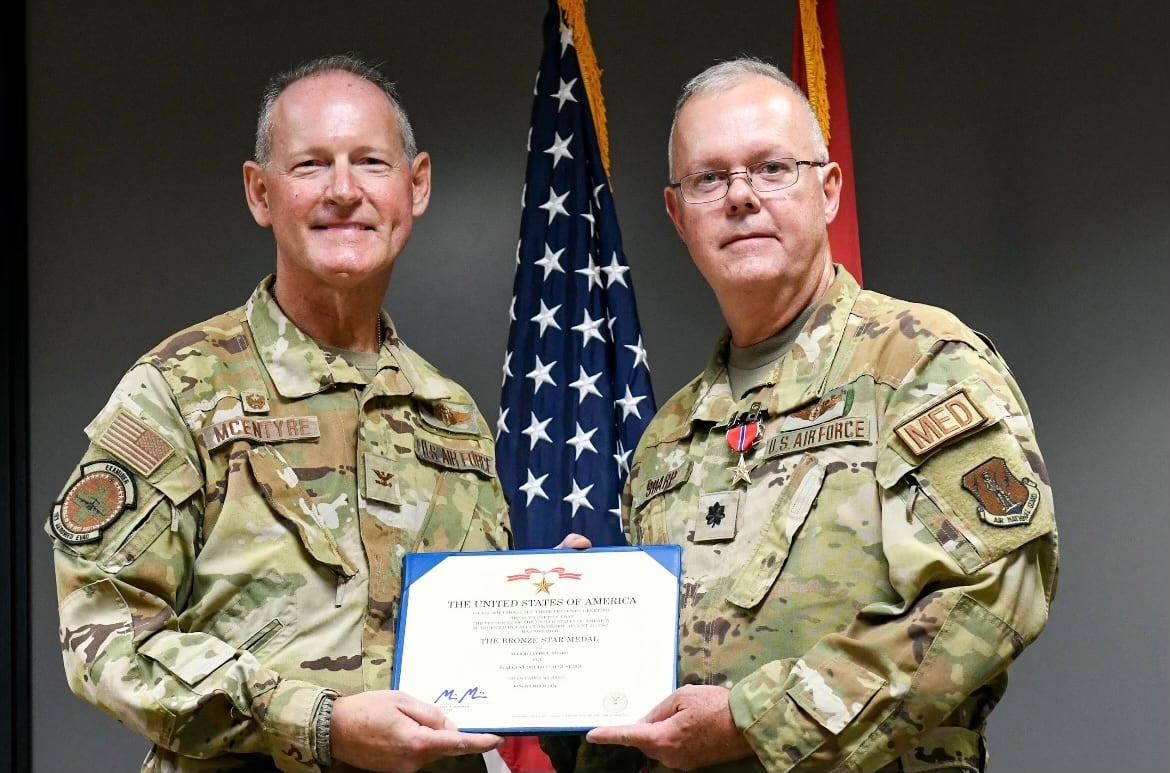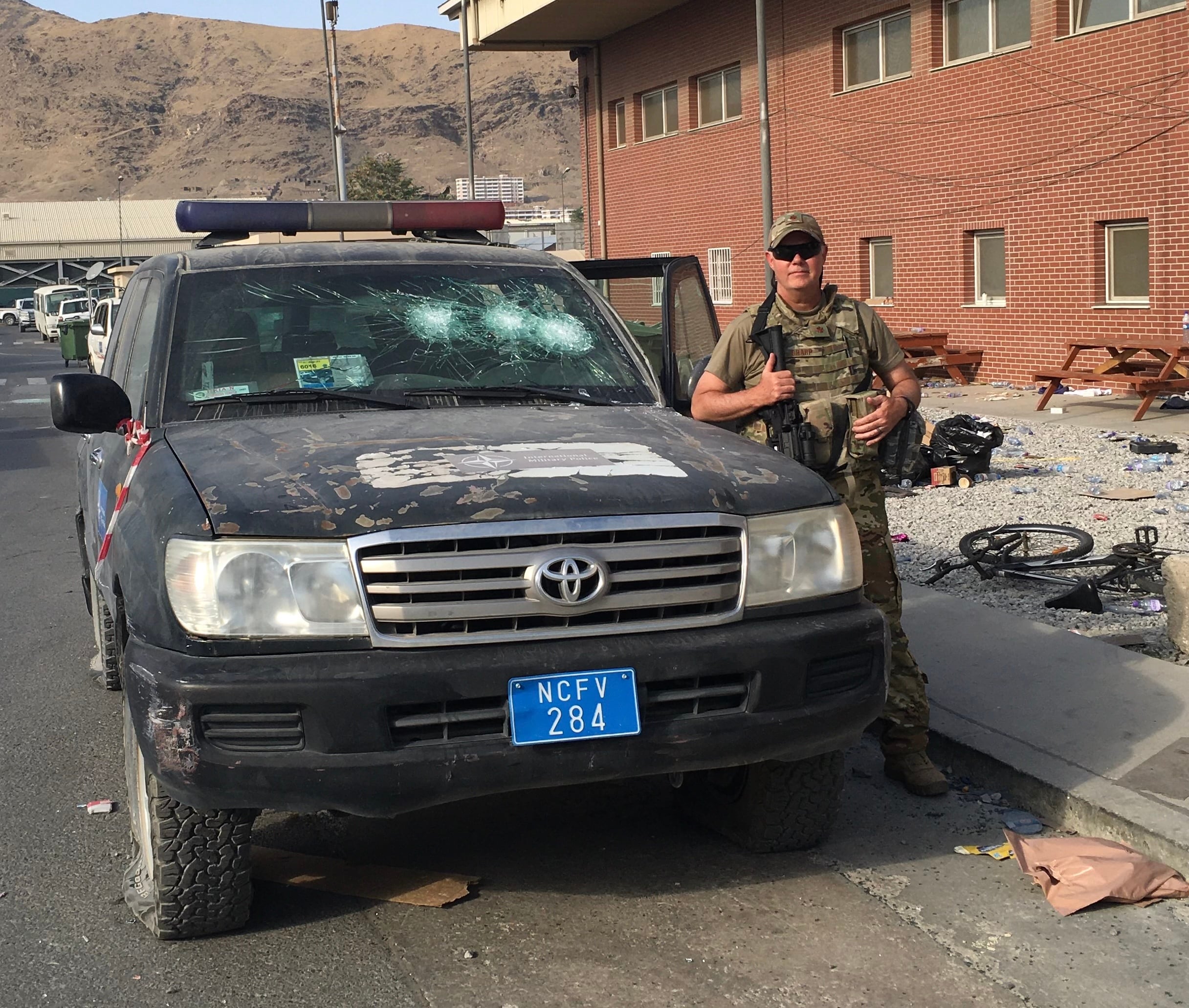When he arrived in Afghanistan on Aug. 18, 2021, during the chaotic final weeks of America’s war there, Air Force Lt. Col. Jayde Sharp didn’t know what to expect.
Sharp had deployed to Hamid Karzai International Airport with the 183rd Aeromedical Evacuation Squadron, a unit belonging to the 172nd Airlift Wing of the Mississippi Air National Guard. He was there to assist with the U.S. withdrawal after decades of conflict, a pullout that was becoming more unhinged and chaotic by the hour.
As an aeromedical evacuation officer, Sharp arrived expecting to treat sprains, heat exhaustion or even a local’s pregnancy as desperate Afghans thronged the airport where U.S. troops were struggling to maintain order.
Sharp soon felt the tension hanging in the air.
Eight days later, on Aug. 26, an ISIS-K suicide bomber detonated at the airport’s Abbey Gate, killing 11 Marines, a soldier and a Navy corpsman, along with roughly 170 Afghans.
“Mass cal’ rang out over the intercom,” Sharp told Military Times, using a shorthand for “mass casualty.”
Sharp’s mission changed in a flash. He leapt into action, helping to evacuate 38 badly injured civilians and fellow service members.
For his actions during the chaotic evacuation, Sharp received the Bronze Star.
“His remarkable performance and selfless commitment to his fellow comrades-in-arms and the local populace saved countless lives,” according to the award citation, which was presented to Sharp this month.
Flight nurses like Sharp do not typically provide medical care on the ground. When the explosion rang out, he left the safety of his medical facility to treat and triage casualties.
Sharp’s efforts saved the lives of multiple Marines, including one whose carotid artery was severed after being shot in the face and neck, according to the citation.
Sharp provided medical attention while exposing himself to the threat of additional attacks as well, the citation said.
At the airport medical facility, Sharp witnessed the 13 deceased troops come through the door. He then worked around the clock to treat others, hoping to prevent further carnage.
The unity and selflessness of his medical comrades that day have stayed with Sharp, but so has the jarring trauma of Abbey Gate.

Coming home proved difficult. Sharp said he felt irrevocably changed. Large crowds were suddenly intolerable. Each day was spent living on a short fuse.
It wasn’t just the chaos and lives lost, he said, but fearing for his own life as well.
“What bothered me the most was the emotional part of [thinking] this could be the end,” Sharp said.
The threat level was so high on the day of the Abbey Gate bombing that at one point Sharp’s superior walked by and told everyone, “If you’re not right with the lord, you need to get right,” he recalled.
In those moments, Sharp wondered how his family would be able to deal with his passing. How would his wife, kids and grandkids handle life without him?
Such thoughts had to be set aside at times, like when he treated an Afghan boy he said must have been his grandson’s age.
“I have a grandson that’s four years old now and when that baby came up it reminded me so much of my grandson,” he said. “Just the haircut and the size.”
Sharp and his team performed CPR on the child, resuscitated him and put him on a ventilator. The boy was evacuated but later died of a brain bleed, Sharp said.
It’s an image that still haunts him. Service members make decisions to put themselves in harm’s way, he said, but the child did not have a choice. The boy’s parents were desperately trying to get him to a country where he could live a better life. In that process, the child lost his life.

The events surrounding the attack feel like yesterday for Sharp. It’s been three years, but he says he is only just now returning to some semblance of normality.
There was no way to train for that experience, he said. It was just something those on the ground had to find a way to deal with.
Sharp credits his family and friends — including his fellow personnel — for helping him through the tough times.
“I don’t know how to thank the 183rd and 172nd enough,” Sharp said.
During the aftermath of the attack, Sharp received a box with 50 units of blood. His team was critically low on supply. It was delivered from Ramstein Air Base, Germany, he said, and the chief nurse there was a forward-deployed member he knew from the 183rd.
Sharp, who is a lover of Mexican food, opened the box to find a Mexican food MRE sitting on top with his name written across it in Sharpie.
The small gesture amid the horror brought a smile to his face. Curious colleagues inquired about the package.
“I’ll tell you later,” he said.
And they went back to work.
Riley Ceder is a reporter at Military Times, where he covers breaking news, criminal justice, investigations, and cyber. He previously worked as an investigative practicum student at The Washington Post, where he contributed to the Abused by the Badge investigation.





